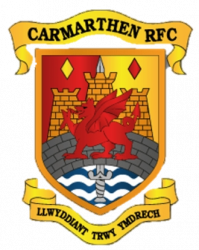Mr. W. J. Orman
Club Chairman – 1947/48-1948/49; 1953/54; 1967/68-1975/76
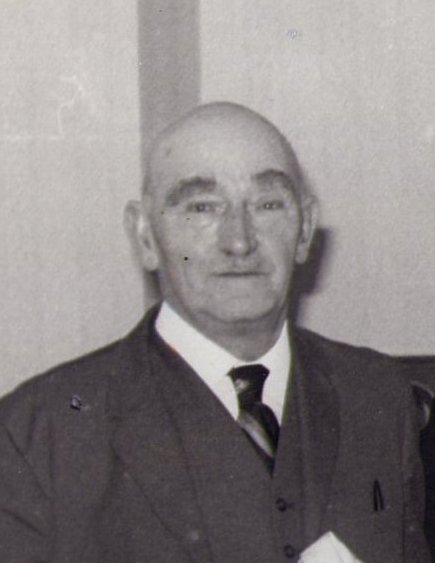
His Father – James Alexander Orman
Ex-mayor and local historian Richard Goodridge has been in contact with the club to share with us the result of his research into the life of James Alexander Orman, the father of the late Bill Orman, past 1 st XV captain and past chairman of the Quins Club.
Message from Richard:
“I have written a story about the late Bill Orman’s father who was killed in action in 1918 in Palestine. I visited his grave last week in Jerusalem. The story includes several photographs including one I took of Bill (with his Quins Club Jumper on) holding his father’s medals. I know that Bill was a great supporter and indeed Chairman of the Club many years ago as well as an outstanding player.
It would be good to see it published on the Clubs website perhaps for those interested in Carmarthen history. It’s a really lovely story and I would be happy to send it to you if you would like.”
Our grateful thanks to Richard for sharing this information with us as it all adds to our club’s long history.
INTRODUCTION TO THE STORY OF SGT ORMAN DCM.
In February 1987, I wrote the following story for the local newspaper called the Carmarthen Journal. It was a story about a family who struggled to make ends meet during the Great War as a result of the head of the family and “bread winner” being killed in action in Palestine in 1918. For a young mother with two small children to have her husband suddenly taken away from her was of course common place in the Great War, and especially so for many of those who fought in what was some of the most severest fighting in the Gallipoli campaign of 1915 where James was to win his Distinguished Conduct Medal.
James Alexander Orman was already serving as a territorial volunteer before the outbreak of the Great War and when the call came he joined the Welch Regiment in September 1914. Having survived four years of some of the most ferocious battles, his life was ended in Palestine in March 1918 when he was shot by a sniper and died instantly. Despite having won the DCM three years earlier in 1915 James was never able to return home to receive it or the many accolades due to him.
It was a great privilege for me therefore, with an interest in local history to one day go and visit his son William in 1987 and to ask him directly about his memories and thoughts of that terrible event in 1918 leaving his mother a war widow with two children to bring up. During that visit to his house we spoke at great length and I took the photograph you see today of him holding his fathers medals and of course of his fathers DCM which was pinned to his chest 67 years earlier. We both shed many tears during that visit, especially so when he handed me a photograph of his father taken before the outbreak of the war in 1913, when he served in the local volunteer detachment. In a “spur of the moment” thought, I asked him to write a message on the back of the photograph to his father so that if I ever had the opportunity to visit his grave I would do so and attach the photograph to the wreath in doing so…..his message read…. “To dad, I missed you then, and I miss you now with all my heart, God bless you” At the age of 79, it was a tearful but heartfelt message that 34 years later in 2021 I was personally able to deliver when I finally laid a wreath at his fathers graveside with the photograph attached, after a promise I made all those years previously. Again in April of this year (2023) I was able to revisit his grave and place a bouquet of fresh flowers on it together with a sprig of Chrysanthemum on his friend’s grave – Private Ernest Tilley, who lies next to him and was killed the day after James on the 10th March 1918. At the outbreak of the First World War, Palestine (now Israel) was part of the Turkish Empire and it was not entered by Allied forces until December 1916. As a former Mayor of Carmarthen myself, it was an even greater privilege to have done so. William passed away peacefully in November 1990 aged 82 and is buried in St David’s Cemetery Carmarthen. His mother Emma died in 1963 aged 78 and is buried close by.
Richard Goodridge MBE. JP
The late Bill Orman in Quins jumper
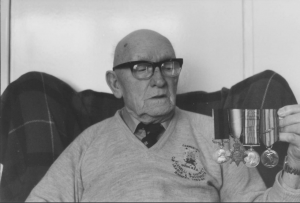
Sgt. Orman Original Wooden Cross and Photo
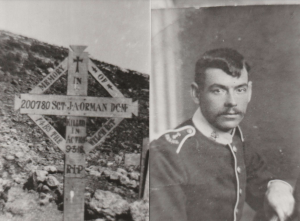
Jerusalem War Cemetry entrance
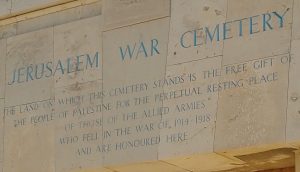
Wreath Laying at Grave
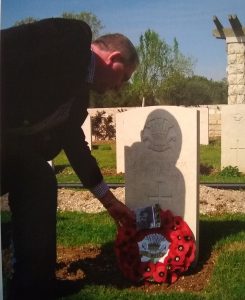
At the grave of Sgt Orman and Pte Tilley
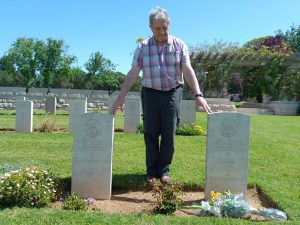
GONE BUT NOT FORGOTTEN
THE FREEMAN WHO NEVER WAS
(First published in the Carmarthen Journal – February 1987)
James Alexander Orman who lived at no 6 Glannant Road Carmarthen was by profession a miner who worked at New Dynant colliery Cross Hands.
James was not a native of Carmarthen having been born into a sea faring
family at Southampton, and it was his fear of the sea that drove him to
look for work more inland. Before coming to live in Carmarthen he worked
for some time in the Cornish Tin Mines. Like so many others of his day James was a very patriotic and a very hard working family man. Sometime prior to the
outbreak of the First World War James entered the Territorial Army at
Carmarthen and having worked his way up the ladder, was prior to the outbreak
responsible in part for the training of new recruits. It was only when Sgt Orman saw action in the Dardanelles that he was to create history for the ancient borough of Carmarthen. Sergeant Orman was the very first recipient of the Distinguished Conduct Medal to have come from Carmarthen. Because of that distinction it was agreed by the Town council to grant him the Freedom of the Borough.
However Sergeant Orman was the Freeman who never was, for on the 9th of
March 1918 he was killed in action having been shot by a sniper. On March
29th 1918 it was reported…. “Official intimation was received by
Mrs Orman of Glannant road on Friday last of the death in action in
Palestine on the 9th March 1918 of her husband Sgt James Orman DCM
Welsh Regiment. The deceased who was 31 years of age joined up in the
early stages of the war and served in the Dardanelles where he was
awarded the DCM for great gallantry. He was well known and highly
esteemed in the town and the deepest sympathy is extended to his widow and two children. A native of Southampton he came from a fine family with a fine fighting record, his father and several brothers having served in the Royal Navy for many years”
Four months later on the 10th July 1918 a ceremony was to take place which
remains unique in Carmarthen’s history and which even to this day remains
vividly in the memory of one person at least. On August 2nd1918 the Journal
reported thus… “Boy Decorated with his Fathers Medal” There was an interesting ceremony in Guildhall square on Tuesday when the Distinguished Conduct Medal won by the late Sgt James Orman -Welsh Regt, for conspicuous gallantry at SUVLA BAY in August was publicly presented to his ten year old son William James Orman by Colonel L Banon CB officer commanding no 4
district. The Mayor Alderman William Evans presided, and there were in attendance a contingent of the local volunteers, the labour battalion and
the wounded soldiers treated at the local hospital – all under command of
Major Briscoe. Next to the Mayor sat Sgt Orman’s little son and daughter
accompanied by their widowed mother who is a sister of police Sgt Hodge
Lewis of Kidwelly. The following relatives were also present; Miss
Gwendoline Orman (niece) Miss Nellie Orman (sister) Mr W C Lewis and
Miss Freda Lewis (nephew and niece)
The Mayor explained that the Town Council had decided to confer the Freedom of the Borough on Sgt 0rman DCM in recognition of his distinction, but unfortunately he was killed by a sniper on March 9th 1918
whilst engaged in gallantly assisting to hold a hill against the enemy.
Sgt Orman joined the forces at the start of the war and went through the
thick of the subsequent fighting in the Dardanelles. The Mayor said that
he would like to see all Carmarthen men who win distinctions
spared, to come back to receive the Freedom of the borou5h and it was a
matter of extreme sadness that Sergeant Orman made the supreme sacrifice
before he could be honoured by the Town. However it was very fitting that
they could present his son the medal which the father had so bravely won
so that it could be handed down as an heirloom in the family. Colonel Banon CB read an extract from the London Gazette which describes only briefly how Sgt Orman won the DCM which read… “For conspicuous gallantry on August 11th 1915 at Suvla in attacking and reconnaissance of the enemy position under heavy fire. On August 12th, he voluntarily carried an important message under very dangerous conditions” Colonel Banon stated that they had met there to do honour to a worthy citizen of Carmarthen and a gallant soldier.
As a territorial in peacetime Sgt Orman was one of a comparatively small,
percentage of the British population who recognised what their duty was
before the war came on. Too high a praise could not be bestowed on those men
who voluntarily joined the forces before the war and gave a great deal of
their time at great inconvenience to themselves and often at considerable
expense in order to defend their country when the time came. He did not
think the good work they had done had always been recognised.
When war came Sergeant Orman left his home & his work and
his loved ones and very quickly went out to the front. Those who had paid
the great sacrifice in the war had not laid down their rives in vain. Colonel
Banon went on “To remain true to their memory we must see our way through
to a final victory and do everything in our power to that end. There is a
small percentage of men and women who so far have done nothing to assist
their country to win this war. I ask any of those to consider whether they
are lending their full weight to win the war or whether they were simply
passengers on the coach or even a sprag on the wheel” . He had great pleasure
to visit Carmarthen to present Sgt Orman’s son with the Distinguished Conduct
Medal which his father had so nobly won. He knew that in Carmarthen, the
boy would find many citizens who would do everything they could to help him
to feel less the loss he had sustained and would help him to be as good
and true a citizen as his father had been. After shaking hands heartily
with the boy, Colonel Banon pinned the medal to the boys breast amid loud
applause. This is what the Colonel told the young William “I hope my lad
you will live very many years and l-live them with great credit to yourself
and that you will prove yourself a worthy son of such a gallant father and
distinguished, citizen of Carmarthen. I wish you the best of luck, and am
sure Carmarthen citizens will do everything possible to help you
forward in a distinguished career”
On the 6th of January this year the young boy – William Orman was 79 years old, and having lived in Carmarthen all his life stil1 remembers those events which were to change his and his families life so dramatically 69 years ago, and has never forgotten the generous help given by the people of Carmarthen at the time to help him, and his mother and sister to live a normal life as possible, and to them he will always be eternally grateful
About his fathers exploits in the Great War Bill goes on to say… “His
first clash with the enemy was in Gallipoli where he was mentioned
in despatches on three separate occasions and was decorated with the
ribbon of the DCM and was expected to receive the medal on his return
to this country which he never did. At this tine he had risen to the rank
of Sergeant Major and was offered a commission in the field but he refused
it as it meant a reduction in payment to his wife as he would have had
to contribute towards the officers mess. At this time the allowance to
my mother was two pounds six shillings and eightpence. It was also compulsory at this time to billet soldiers and my mother had two from the Liverpool Irish staying and that helped to run the home. On hearing the news of my father’s death my mother was taken seriously ill and nearly died. She was confined to bed for six months and with the help of my Auntie Mary and many friends she
recovered. .. After a brief pause for thought Bill goes on… “My
Uncle William was also killed you know in Gallipoli in 1915, he was
with the Welsh horse end he also fought in the Boer War in South Africa. His
name was William Cooper Lewis and he lived in Catherine Street. Before
the war he worked at the old Towy sawmills and was a great Town footballer
too….. “Such a waste”
Today Sergeant Orman lies buried in the Commonwealth War Graves Commission cemetery in Jerusalem – his resting place marked with a headstone engraved with the emblem of his beloved Welch Regiment, but because of the distance involved Bill has never been able to visit it. However, although he lies buried thousands of miles away he is never far from his thoughts and will never be forgotten by the town which adopted him.
AT THE GOING DOWN OF THE SUN
AND IN THE MORNINIG
WE WILL REMEMBER THEM.
